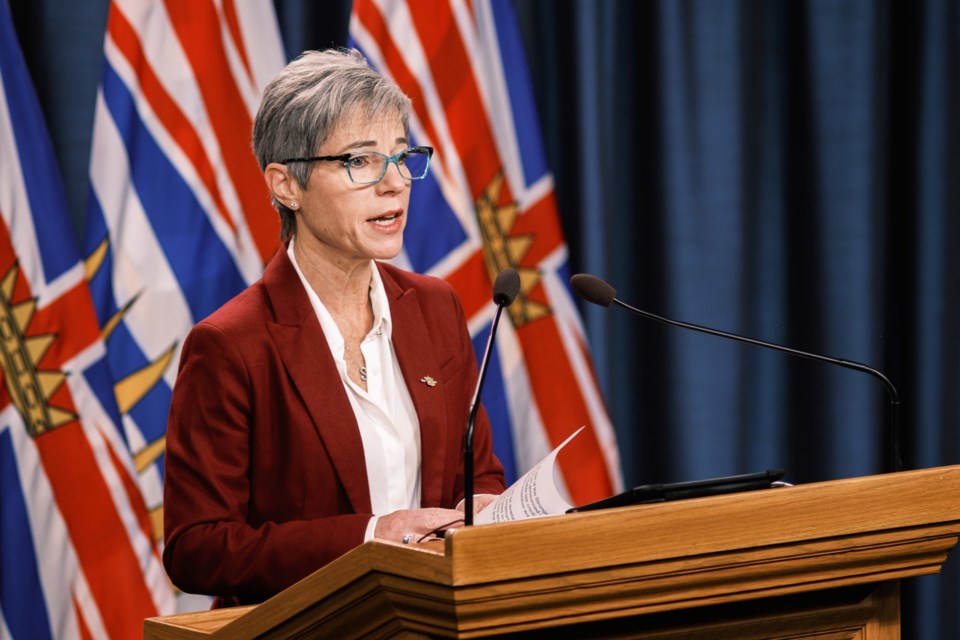Finance Minister Selina Robinson has an unenviable task next month: table a provincial budget that tackles not only the Omicron wave, but also BC’s recent flooding disaster, as well as wage demands from hundreds of thousands of public sector workers whose collective agreements are about to expire.
Nobody said being finance minister was easy.
It’s especially hard right now for Robinson, with profound spending pressures coming from all sides.
BC will likely bring in almost $70 billion in revenue in the next year, thanks in part to billions in profits from the red hot real estate sector.
More than half, roughly $37 billion, is spoken for: salaries to 490,000 public sector employees like doctors, nurses, teachers, post-secondary professors, transit drivers, social workers and government employees.
Most collective agreements end this year. Major unions predictably want raises and better working conditions. Rising inflation will add to the wage pressures. Some professions, such as nurses, have strong cases for big compensation boosts to help with a chronic shortage of health care staff made worse by COVID-19 burnout.
Every one per cent increase in salary for the public sector will cost the BC budget $370 million.
Most unions got two per cent annual wage increases in their last contracts, meaning the province should be looking at setting aside another $740 million annually if it expects to lock down similar deals, plus likely tens of millions more in special incentives to recruit and retain healthcare workers.
Meanwhile, Robinson will have to find money for the province’s ongoing emergencies.
Municipalities want access to some of the almost $2 billion in revenue annually from the provincial carbon tax to help them pay for local emergency preparedness planning identified as desperately-needed after devastating floods and wildfires.
The ask comes at a time when the provincial treasury can’t afford the lost revenue. But Robinson may have to cough it up anyway if BC wants to continue using an emergency response system that relies on local governments to take the lead.
Public Safety Minister Mike Farnworth has said he’ll announce changes to BC’s emergency management system in the spring, and those are unlikely to be cheap either. He’ll be looking for new cash from the finance minister to fund his revisions.
Robinson also needs to set aside money to help the town of Lytton rebuild after last June’s wildfire, the city of Merritt rebuild after November’s flooding and the Fraser Valley agriculture sector recover from floods in December.
Then there’s COVID-19. It just won’t go away.
It decimated BC’s finances last year, blowing a $9.7 billion hole in the budget that has shrunk over time to $1.7 billion in the last update.
BC businesses are demanding new aid after public health restrictions shut down gyms, conference centres and major indoor gatherings, as well as cut capacity to 50 per cent in other sectors. The province’s only response so far has been to announce up to $10,000 “COVID-19 Closure Relief Grants” that people can’t even apply for until later this month. At $10 million total, it’s not going to cut it for aid needed in this wave.
So in summary, BC’s next budget needs to balance the enormous cost of public sector wage increases, financial assistance for unprecedented natural disasters, an overhaul of the province’s emergency management system and new aid for the never-ending damage caused by COVID-19.
Oh, all while keeping the deficit and debt as low as possible to avoid impacting the province’s credit rating.
Robinson is maintaining a sunny disposition in the face of that challenge.
“We’ve come through the last few years as a province by looking after each other,” she said in a statement.
“That same principle – that we’re all in this together, and we have a responsibility to look out for each other – is what I bring to my work each day.
“It’s also how we are looking at the budget ahead and the challenges that we face – whether it’s how we support people through this latest wave of the pandemic, how we support communities to prepare for and respond to the natural disasters that are increasing with climate change, or how we work with businesses across the province to continue to build a strong recovery and seize the opportunities of a changing economy.”
We’ll see what the final balancing act looks like on budget day, Feb. 22.
But it’s unlikely there’s enough money in the provincial treasury to accomplish it all.
Rob Shaw has spent more than 13 years covering BC politics, now reporting for CHEK News and writing for The Orca. He is the co-author of the national best-selling book A Matter of Confidence, and a regular guest on CBC Radio.



